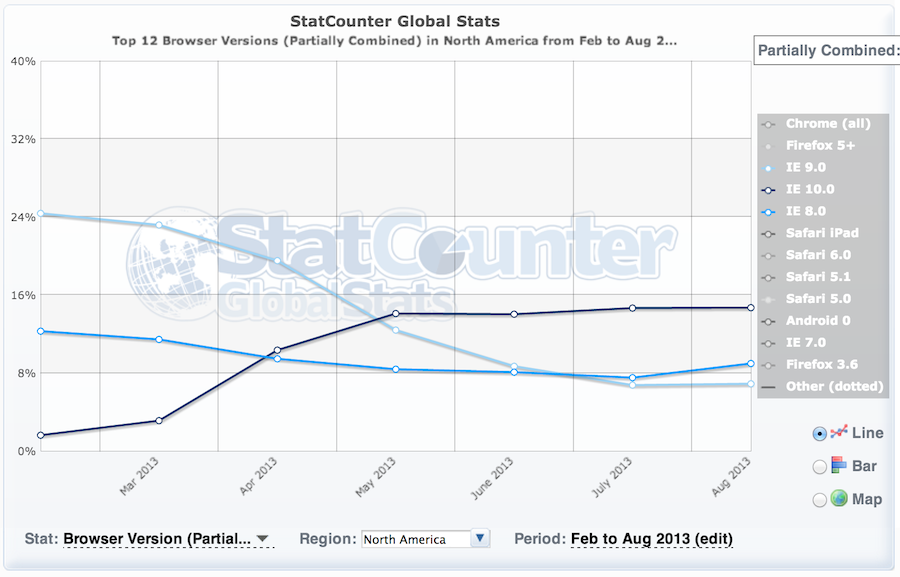Why I'm not supporting old IE versions
I’m serious, not even IE9.
It seems odd that in a world where most have just accepted dropping IE6/7 support that I should be so ready to drop IE8 and IE9 in the dustbin too but the fact is old IE versions are no longer relevant for the vast majority of the web and I see little reason to support their outdated quirks on new projects.
Now compared with IE9 dropping IE8 support is easier to justify. It’s old, already has it’s own countdown site and Windows XP (the only reason you would be limited to using IE8) is reaching “end-of-life” next April. Google is pulling support for it from apps, analytics and other products, other companies have already dropped support, even jQuery no longer supports it as of version 2.0. I suppose one could argue that because it is still clinging on to about 10% market share we should keep supporting it for now, but that argument is weakened by the fact that few people use IE8 by choice. This recent article looked at the daily trends of browser usage and noted that both IE8 and IE9 usage drops sharply on the weekends.
These days older IE versions are found almost exclusively in corporate environments where software upgrades are controlled centrally by IT departments and as a result there can be a bit of a lag. So unless you are specifically targeting corporate use you can bet that most people don’t use your site/app on IE8/9 or at least the don’t need to. Moreover, because the EOL on XP is coming up fast it is likely that even these last remaining holdouts will be planning upgrades in the next 6-8 months and likely will end up using IE10 or even IE11 at that time.
But wait! There’s is even more good news. Thanks to Microsoft’s adoption of a silent (Chrome style) update policy we are witnessing, for the first time, an immediate and sharp drop in IE9 use as IE10 takes over and will likely see it again when IE11 drops. IE users are now being upgraded to new versions as they are released (at least the ones who aren’t forced to keep behind at work). Which leads to my next point, which is if we don’t need to support IE8 we don’t need to support IE9 anymore either.

Source: StatCounter Global Stats - Browser Version (Partially Combined) Market Share</p>
Lets face it, the technical reasons for not supporting IE8 are obvious, modern standards and features, modern frameworks (jQuery 2.0) less need for shim code and less effort spent making things work or look right under the limitations of outdated technology. What may be surprising though is that these same arguments largely apply to IE9, a browser that was supposed to bring IE into a bright HTML5 and modern standards future.
It’s true though, IE9 is missing support many, now commonplace, modern web APIs. The history API, CSS transitions and animations, input placeholders, XMLHttpRequest2, Web Sockets, etc. All this adds up to a huge PITA if you want to start using modern features that are commonplace on every single other browser (including IE10/11).
But as I said before, we have left the era of IE browser relics. Sure there will always be a few around, a few holdouts here and there. But for the vast majority of IE users we can start assuming they have the latest and the greatest. Isn’t it wonderful?